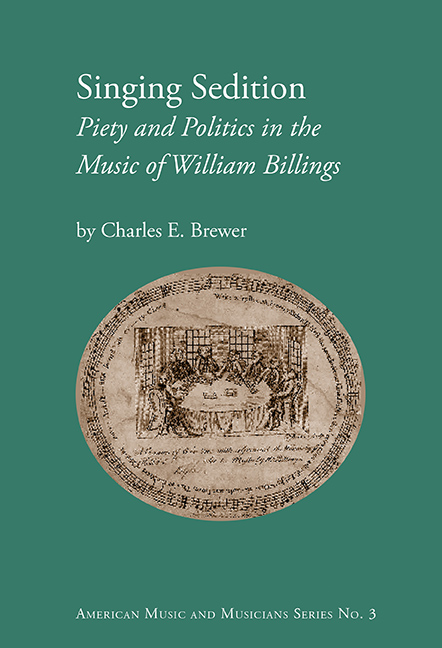Book contents
- Frontmatter
- Table of Contents
- List of Illustrations, Musical Examples, and Tables
- Prologue
- Acknowledgements
- Abbreviations
- Part I Rebellious Voices in Billings's Boston
- Part II Singing the Rebellion
- Chapter Three Shiloh and the Meanings of Christmas
- Chapter Four Billings's Anthems: Lamentation to Independence
- Chapter Five “Victory that Day was Turned into Mourning”
- Chapter Six “I Am the Rose of Sharon”: Rev. Samuel Cooper and William Billings
- Chapter Seven “Peace be on Earth, Good Will towards Men”
- Epilogue
- Appendices
- Bibliography
- Index
Chapter Six - “I Am the Rose of Sharon”: Rev. Samuel Cooper and William Billings
from Part II - Singing the Rebellion
- Frontmatter
- Table of Contents
- List of Illustrations, Musical Examples, and Tables
- Prologue
- Acknowledgements
- Abbreviations
- Part I Rebellious Voices in Billings's Boston
- Part II Singing the Rebellion
- Chapter Three Shiloh and the Meanings of Christmas
- Chapter Four Billings's Anthems: Lamentation to Independence
- Chapter Five “Victory that Day was Turned into Mourning”
- Chapter Six “I Am the Rose of Sharon”: Rev. Samuel Cooper and William Billings
- Chapter Seven “Peace be on Earth, Good Will towards Men”
- Epilogue
- Appendices
- Bibliography
- Index
Summary
In contrast to the many anecdotes that relate William Billings and Samuel Adams, the only document that directly connects Billings with Rev. Samuel Cooper is an anthem he composed for the pastor's funeral on 2 January 1784. Adams and Cooper were both members of the inner circle of Boston patriots, though Cooper never took upon himself a very public role. In contrast to Rev. John Lathrop, whose radical pronouncements came from both the pulpit and the press, Cooper expressed his thoughts only through his letters and perhaps in anonymous publications in the Boston Gazette. There are reasons to suspect, however, that beyond the public funeral anthem, Billings acknowledged Cooper's importance to the patriot cause in more subtle ways.
“ I AM THE ROSE OF SHARON”
During his lifetime, Billings published three anthems based upon texts from the Song of Songs. Two of these anthems (“I Am Come Into My Garden” and “I Charge You, O Ye Daughters”) appeared in his last publication, The Continental Harmony, and were never reprinted. The other, “An Anthem. Solomon's Songs, Chap. 2d.,” “I Am The Rose of Sharon,” became one of his most popular, and was reprinted in at least sixteen other collections between its first publication in The Singing-Master's Assistant (1778) and 1820 (see Illustration 6.1).
“An Anthem, Solomon's Songs, Chapt. 2d.”
I am the Rose of Sharon and the Lilly of the Vallies.
As the Lilly among the thorns, so is my Love among the Daughters.
As the Apple-tree among the trees of the Wood,
so is my Beloved among the Sons.
I sat down under his shadow with great delight,
And his fruit was sweet to my taste.
He brought me to the Banqueting House,
His Banner over me was Love.
Stay me with Flagons, Comfort me with Apples,
for I am sick of Love.
I charge you, O ye Daughters of Jerusalem,
by the Roes and by the Hinds of the Field,
that you stir not up nor Awake my Love till he please.
The voice of my Beloved, Behold, he cometh,
Leaping upon the mountains, skipping upon the Hills.
My Beloved spake and said unto me:
rise up, my Love, my fair one, and come away.
For lo, the Winter is past, the rain is over and gone.
- Type
- Chapter
- Information
- Singing SeditionPiety and Politics in the Music of William Billings, pp. 165 - 206Publisher: Boydell & BrewerPrint publication year: 2017

